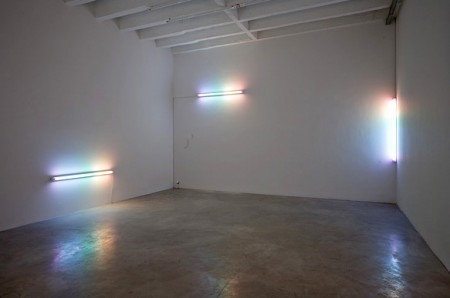Spencer Finch
01 Dec 2007 - 26 Jan 2008
Spencer Finch
In Praise of Shadows
1 Dec 2007 - 26 Jan 2008
Galerie Nordenhake is pleased to present “In Praise of Shadows” an exhibition with new works by the artist Spencer Finch. Shadows are an always present element of Spencer Finch’s artistic exploration of the psychological and physiological aspects of perception and its limits. His current show at MASS MoCA exemplifies the wide range of ideas and visual modes with which Finch approaches the paradoxical nature of light and colour. The show “In Praise of Shadows”, however, is specifically devoted to the complex world of shadows. The title derives from Jun’ichiro Tanizaki’s short 1933 treatise, a meditation on the aesthetics of shadows in Japanese culture, threatened by the omnipresence of electric light: “Were it not for shadows, there would be no beauty”, Tanazaki states. Finch’s exhibition can be seen as a small visual anthology of shadows. Old and new drawings will be exhibited alongside new photographs, light installations, and cyanotypes that illustrate the diverse aspects of shadows.
Six drawings are displayed on the narrow walls alongside the large gallery windows, transporting the viewer to Johann Wolfgang von Goethe’s house in Weimar. They are accurate chromatic replicas of the shadows cast on a November day in the house where Goethe wrote his “Theory of Colour“ (1810), and where he most likely performed his experiments on coloured shadows. Goethe defined colour as the result of a dynamic interplay between light and darkness. Although Goethe’s theory was rejected in favour of Newton’s purely physical explanation, Goethe’s observations laid the groundwork for colour psychology.
A series of 12 photographs captures the transient shadows cast by a lemon tree over the course of a day. The artist travelled to Spain and took the photos at equal intervals from dawn till dusk to record the revolution of the sun around the tree. The work is inspired by a poem about a barren orange tree, written by Federico García Lorca, which adds a melancholic tone to the delicate photographic renderings and points to the long tradition of ascribing shadows deeper psychological meanings. Lorca’s orange tree invokes a woodcutter to cut away his shadow because it can’t stand the torment of seeing itself in its fruitless silhouette.
Eugène Atget, master of the photographic conservation of old Paris, is honoured in a light installation in the second room of the gallery. Finch uses colour filters and fluorescent lights to re-create the exact darkness of the shadows cast in the Parisian alleyways that were photographed by Atget around 100 years ago.
What remains constant in Finch’s work is that he merges dry, scientific methods of measurement and documentation with his subjective creative expression, here demonstrating that shadows are far more than regions of darkness where light is blocked. Rather, they are optical shapes that beckon towards a subjective sublime, reflecting the human condition of never being able to completely know what exists in nature, waiting in the shadows for a stroke of lightning.
In Praise of Shadows
1 Dec 2007 - 26 Jan 2008
Galerie Nordenhake is pleased to present “In Praise of Shadows” an exhibition with new works by the artist Spencer Finch. Shadows are an always present element of Spencer Finch’s artistic exploration of the psychological and physiological aspects of perception and its limits. His current show at MASS MoCA exemplifies the wide range of ideas and visual modes with which Finch approaches the paradoxical nature of light and colour. The show “In Praise of Shadows”, however, is specifically devoted to the complex world of shadows. The title derives from Jun’ichiro Tanizaki’s short 1933 treatise, a meditation on the aesthetics of shadows in Japanese culture, threatened by the omnipresence of electric light: “Were it not for shadows, there would be no beauty”, Tanazaki states. Finch’s exhibition can be seen as a small visual anthology of shadows. Old and new drawings will be exhibited alongside new photographs, light installations, and cyanotypes that illustrate the diverse aspects of shadows.
Six drawings are displayed on the narrow walls alongside the large gallery windows, transporting the viewer to Johann Wolfgang von Goethe’s house in Weimar. They are accurate chromatic replicas of the shadows cast on a November day in the house where Goethe wrote his “Theory of Colour“ (1810), and where he most likely performed his experiments on coloured shadows. Goethe defined colour as the result of a dynamic interplay between light and darkness. Although Goethe’s theory was rejected in favour of Newton’s purely physical explanation, Goethe’s observations laid the groundwork for colour psychology.
A series of 12 photographs captures the transient shadows cast by a lemon tree over the course of a day. The artist travelled to Spain and took the photos at equal intervals from dawn till dusk to record the revolution of the sun around the tree. The work is inspired by a poem about a barren orange tree, written by Federico García Lorca, which adds a melancholic tone to the delicate photographic renderings and points to the long tradition of ascribing shadows deeper psychological meanings. Lorca’s orange tree invokes a woodcutter to cut away his shadow because it can’t stand the torment of seeing itself in its fruitless silhouette.
Eugène Atget, master of the photographic conservation of old Paris, is honoured in a light installation in the second room of the gallery. Finch uses colour filters and fluorescent lights to re-create the exact darkness of the shadows cast in the Parisian alleyways that were photographed by Atget around 100 years ago.
What remains constant in Finch’s work is that he merges dry, scientific methods of measurement and documentation with his subjective creative expression, here demonstrating that shadows are far more than regions of darkness where light is blocked. Rather, they are optical shapes that beckon towards a subjective sublime, reflecting the human condition of never being able to completely know what exists in nature, waiting in the shadows for a stroke of lightning.

